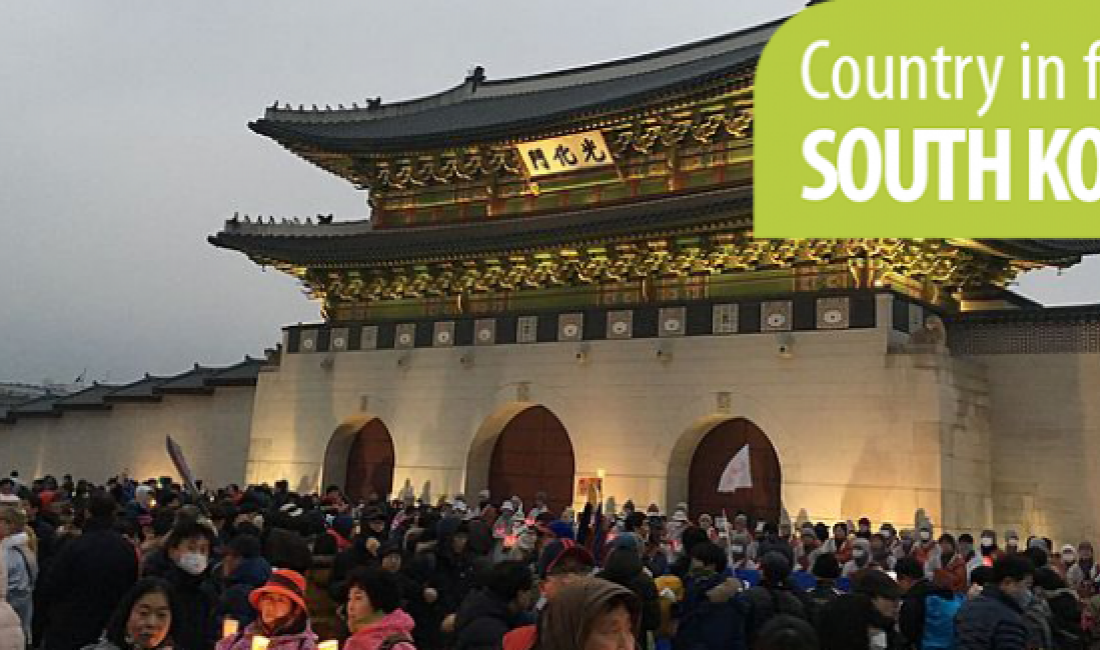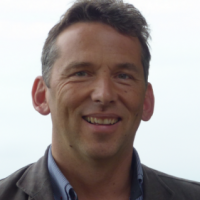The Republic of Korea has gone through turbulent times in the past years, but with the presidency of former democracy activist and human rights lawyer Moon Jae-in hopes for a reinvigorated democracy are stronger than ever. Democracy International founder Daniel Schily spoke to Yoon Lee of the Korea Democracy Foundation on what the future holds.
Just over a year ago, hundreds of thousands of South Koreans participated in the ‘candlelight revolution’ that led to the impeachment and arrest of President Park Geun-hye, daughter of the former military dictator Park Chung-hee and the first female president. The protests against Park Geun-hye had been sparked by a mind-boggling scandal that saw her accused of abuse of power, bribery and granting a personal friend access to state secrets. The scandal caused a unique mobilisation of citizens in the biggest political demonstrations since the 1987 uprising against the military regime. The revolution and Park’s impeachment gave way to a revived democracy movement that carried Moon Jae-in to the presidency, and with him hopes for a modern participatory democracy.
Daniel Schily: We are at the end of a very lively and intense conference about the citizen revolution and the new democratic developments in Korea. You participated in the recent candlelight revolution as well, could you tell us a little about the current situation in Korea?
Yoon Lee: The citizens who participated in the candlelight revolution are very proud of the achievements we made, and so is civil society. Civil society is now watching the new administration and cabinet closely, to see whether they are working well. There are lots of challenges that we inherited from the last administration. Lots of different interests pop up and they all have their own visions and agenda points. It must be daunting for this administration to start work, but they are working together very well with civil society: they want to create new policies that support civil society. So we are all watching very closely.
DS: After the candlelight revolution, it seems like the feelings are very positive; there is a real sense of togetherness. But now, quietly, the day-to-day life comes back into play, how can the Korean Democracy Foundation help society to take the momentum of the revolution forward and really work on democracy?
YL: At the moment, we are working a lot on the subject of democratic citizenship education. I guess traditionally you would call it civic education, but we wanted to clearly disconnect it from this because that existed during the authoritative regime. Through civic education they wanted to engender more loyalty to the nation and to the people in power. I myself, as a student in elementary school, had to memorize oaths to the nation. I still remember some of them! We want to separate what we do from that traditional civic education.
We have been working on democratic citizenship education with several civil society organisations for a long time, but the last two presidents didn’t like the idea we had developed. So the budget decreased a lot and the education department of the Korea Democracy Foundation even had to be dismissed.
DS: So this is actually an important time to remind president Moon Jae-in to really be honest, to stick to his promises to introduce more democracy, also more direct democracy, and fund democracy citizenship education and democracy work.
YL: Yes, so in the cabinet of president Moon there are a couple of people who have worked with us in the past. For example, the Secretary for Civil Society has worked with us on several occasions. He is intensely interested in democratic citizenship education, so we have been able to work more on this topic again. We drafted a new plan for the educational programme, on the national level, with the ministry and we are also working to revive the education department inside the Korean Democracy Foundation.
DS: Has the candlelight revolution changed the attitudes of young people in Korea? Because we often see young people as just students, or even consumers, but it is not always easy for them to engage with political matters. However, these candlelight demonstrations were also social events: did it change the attitudes of young people? Did it push them to get more involved with democracy in Korea?
YL: Oh yes! You know after we achieved the constitutional democratization (in 1987) and the direct election of the president, the younger generation was not interested in politics at all. They just thought that it is an old people’s game. But teenagers right now, they are much more interested in participation! They are interested in issues that concern them directly, like educational policy, bullying in schools and so on. But they are also more interested in social issues in general. They participate in events more often, and they come in big groups.
Sometimes, when they find that educational policy or school policy is unfair, they actually bring up the issue themselves. They make posters or banners and post them on the walls of their schools. Before, principals and teachers would just get rid of these and ignore students’ grievances. They used to think of students as people that they have to lead, and nothing more. They simply expected students to follow them, but these days they can’t suppress students’ opinions, because young people now know their rights, their right to resist or their right to say “no”. This is a big change.
DS: So the culture of speaking up and protest is already there and seems to be well-established after the candlelight revolution. Now we are also looking forward to constitutional change, which had been promised by President Moon Jae-in. Will more instruments of direct democracy be introduced, as he had suggested? What do young people expect from this?
YL: President Moon Jae-in made a couple of comments suggesting that he is in planning to introduce more direct democracy in Korean legislation and the constitution. But this is a very time-consuming issue, because many members of parliament, party members and traditional politicians are actually against it. They fear that more direct democracy will weaken the power of representative democracy. It will take a lot of dialogue with those people who have traditionally held power. Citizens definitely want more direct democracy, but traditional politicians are against it at the moment.
DS: A cultural change is needed for this: the creation of an open culture, a debating culture… But I think the younger people in Korea are ready to practice direct democracy as well as representative democracy.
YL: Yes, this is why working on democratic citizenship education is so important! So that young people can learn more about their rights. They need to practice it on a daily basis. Today the direct democratic culture, the participatory culture, has definitely been cultivated more than it was a decade ago. More people are aware of their rights and of the concept of direct democracy. But to change legislation we need enough political will in the parliament and that is a different challenge entirely.
Civil society will need to engage more and really enter into conversation with members of parliament. Civil society will have to push if the outcome is going to be concrete legislation. President Moon Jae-in is actually in favour of putting elements of the democratisation movement in the constitution, but we need a profound social dialogue and it is going to be a long process. But we need it and we all want it, so things are looking optimistic!




